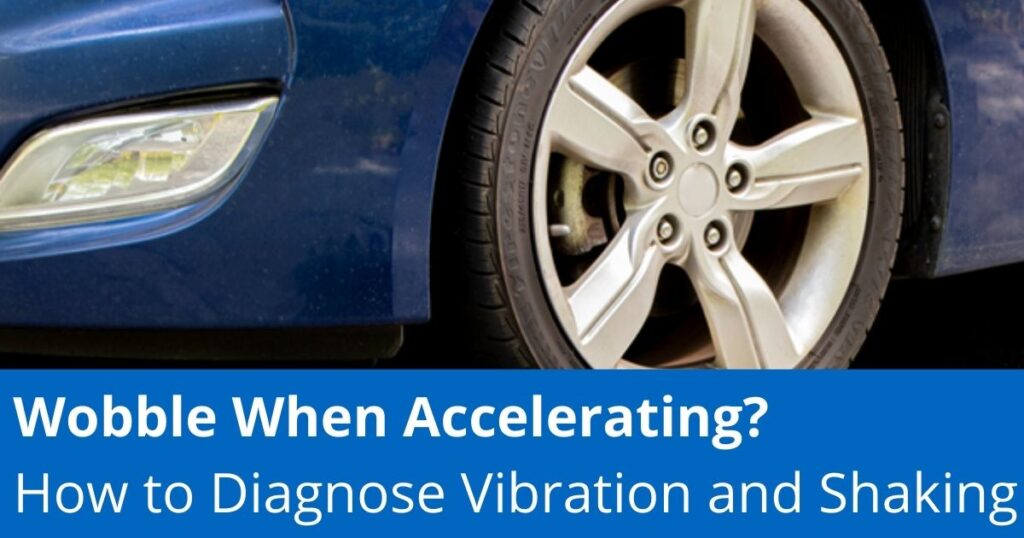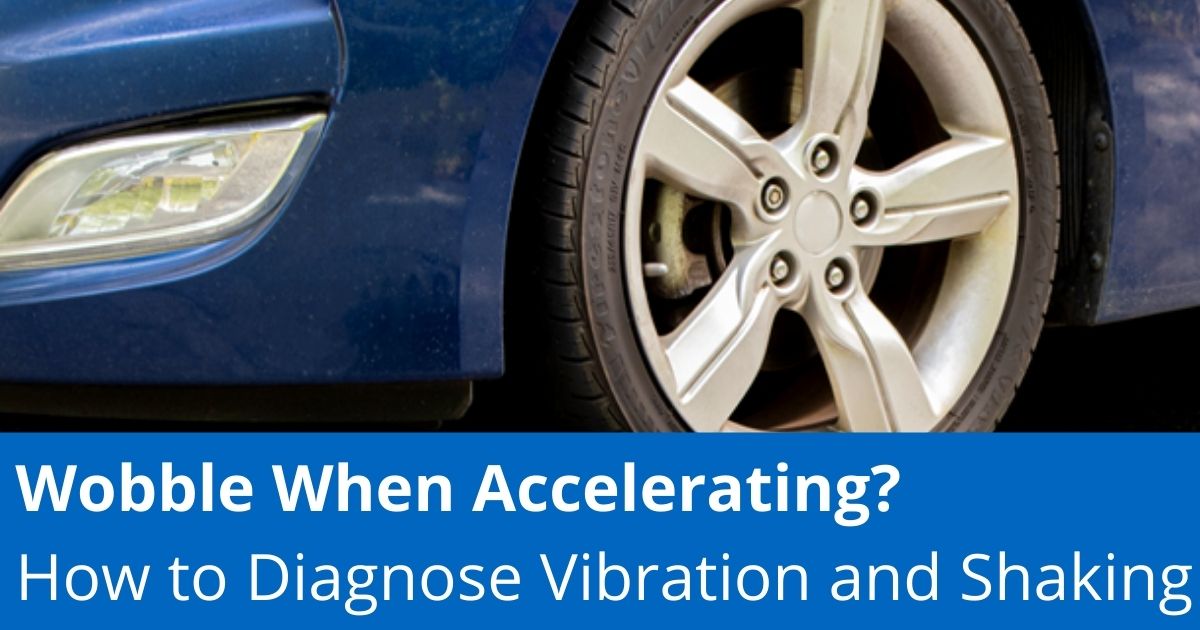
Vibration and Wobble When Accelerating? How to Diagnose Your Car Shaking
Why is my car shaking? There are several reasons why your car could wobble when accelerating. Vibration and shaking mostly occur in car areas where there’s rotation or movement. This includes parts like your wheels and tires, suspension, and driveshaft. In today’s post, we’ll take a look at some of the problems that cause your car to shake when accelerating and areas you can check.

Possible Reasons Why Your Car shakes When Accelerating
1. Unbalanced and Worn Tires
What Causes the Car Tires to Wobble or shake?
Tires are the most common reason behind a shaking car. They are also the easiest to check and cheapest to repair. When a tire rotates, any imbalance in its weight will result in a small wobble. The wobbling increases at higher speeds since the tire will rotate much faster. Tires can also cause vibration and shaking if they are worn out abnormally.
How to Inspect the Tires for Wear
Check for small waves or uneven wear between the treads. You also want to see if there are any flat spots. Flat spots are characterized by areas where the tire looks flattened completely. You can feel this with your hand and even see it when the tire is spinning.
2. Loose Suspension Can Cause Your Car to Start Shaking
How a Worn Suspension Can Cause Vibrations and Shaking
A loose suspension could be the cause of your car shaking and wobbling when accelerating. Minor vibrations in your steering wheel are normal if you’re driving on uneven road surfaces. Naturally, they should go away once you’re on smooth ground. If they don’t, it could be a sign that your suspension components are loose or worn out. The vibrations can become more intense at highway speeds and impede your ability to control your car.
Worn shocks can also cause the vehicle to rattle and wobble a little too hard over road bumps. Since your suspension is responsible for absorbing the impact, it may result in an uncomfortable ride that puts pressure on vehicle parts. You’ll want to check if your suspensions are leaking.
How to Test Shocks and Struts
You can test the shocks and struts by pressing down on the corners of the vehicle and seeing if it bounces excessively. This video reviews the signs of worn shocks and struts and how to inspect them. Read here to go into more detail on the symptoms of bad shocks and struts and how to test them.
3. Loose Tie Rods, Ball Joints, and Wheel Bearings
How a Tie Rod Can Cause Shaking When Accelerating
When the components that make up your front end are loose, they can cause your car to shake and wobble when you accelerate. A bad tie rod end will cause vibrations at speeds of about 20 mph that become more intense at higher vehicle speed. Learn how to inspect an inner tie rod with this post.
How a Ball Joint Can Cause a Shaking When Accelerating
Loose or worn ball joints are normally characterized by intermittent clunking noises that come from one corner of the vehicle. As they continue to wear out, the noise becomes louder followed by some wobbling. This article goes into more detail on how to inspect ball joints.
Different Ways the Wheel Bearing Can Cause Shaking
Wheel bearings are built to handle axial and radial loads in a vehicle. When they go bad, they cause excessive play and vibration in the steering wheel. The vibration increases when you’re making turns or accelerating. You’ll need to check all of these parts as you diagnose the problem. Read here to learn more on how to inspect the wheel hub and bearings.
4. Bad CV Axle Shafts
How a Bad CV Axle Can Cause Shaking When Accelerating
Your CV axle shafts transfer the power from your car’s transmission and differential to the wheels. This allows you to drive forward. If the wobble you feel is excessive and increases when accelerating, it could be due to bad CV shafts. The vibrations may be accompanied by a “bouncy” feeling and clunking sounds when you drive.
How to Inspect the CV Axles
You’ll need to check the CV shafts for binding and if any of the boots are ripped. If they are, they’ll need to be replaced. Check this guide out for a more detailed explanation on checking the CV axles.
5. Bent Drive Shaft
How a Bent Drive Shaft Can Cause Shaking when Accelerating
The wobble you experience when accelerating your car could be caused by a bent drive shaft. In a car that has rear-wheel drive, the driveshaft delivers power from the engine to the rear axle and wheels. If it’s bent or damaged, it causes the car to shake at low speeds and vibrate more rigorously at higher speeds.
How to Test a Drive Shaft
The center support bearing becomes off-kilter. If you spin it, you’ll notice that it rotates abnormally and takes the shape of an egg. This is often caused by wear and tear as a result of aging. You’ll need to also check the U-joints at both ends of the yoke and driveshaft to see if they rock back and forth.
If they have any play or are seized up, the joints are bad. These aren’t serviceable and neither can you repair the drive shaft yourself. The best thing to do is to replace it entirely.
For more information on how to inspect the u-joints and carrier bearings, check out this article
Why Is My Car Shaking? Replace Steering and Suspension Parts (and More) Yourself
Learn how to diagnose and inspect parts like the cv axles, ball joints, tie rods, wheel hub assemblies, and more with 1A Auto’s how-to videos that have step-by-step instructions for all expertise levels.
Related Content
- CV Boot Leaking Grease?
- Clicking Noise While Driving? Diagnose and Fix Bad CV Axles
- How to Diagnose a Bad Inner Tie Rod
- Vibration Under Acceleration
- 3 Reasons Your Car Shakes When Accelerating
- Rattle in Front End When Going Over Bumps?
- Bad Ball Joint? [Expert Advice to Diagnose & Fix]
- Got Wheel Wobble? Test for a Bad or Noisy Wheel Bearing
- Bad Shocks & Struts Symptoms
- When Should Shocks & Struts Be Replaced?
- Can You Drive a Car with Leaking Struts?
- Tire Size Guide—What the Letters and Numbers Mean
- Why You Should Rotate Your Tires
Shop Related Parts
- Steering & Suspension
- Drivetrain
- Tie Rods & Adjusting Sleeves
- Ball Joint
- Axles and CV-Shafts
- Wheel Bearing & Hub Assemblies

